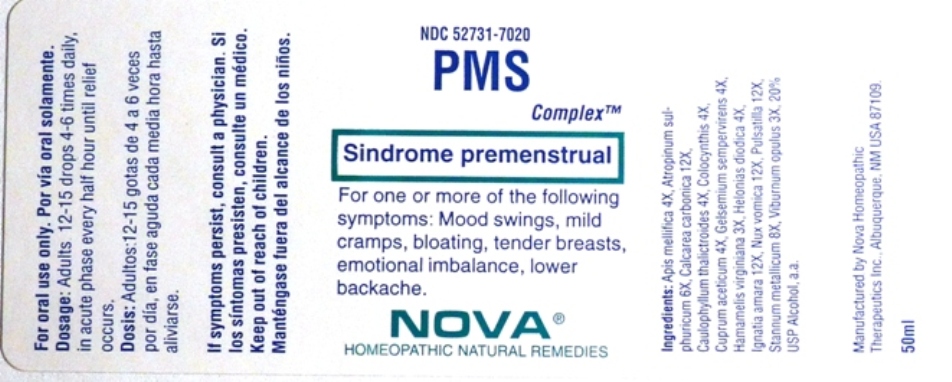
Pms Complex while Breastfeeding
What is Pms Complex used for?
Purpose: Suggested use for one or more of the following symptoms: Mood swings, mild cramps, bloating, tender breasts, emotional imbalance, lower backache.
Is Pms Complex usage safe while breastfeeding? If a lactating mother is using it can there be any effect on growth or development of infant?

Pms Complex Breastfeeding Analsys
Atropine sulfate while Breastfeeding
SafeCAS Number: 51-55-8
Either isolated dose or topical medication are safe for breastfed babies. Anti-cholinergic drugs decrease Prolactin and Oxytocin hormone secretion. Long-standing Atropine treatment could affects mother's milk production. American Academy of Pediatrics: Maternal Medication Usually Compatible With Breastfeeding.
Oyster shell calcium carbonate, crude while Breastfeeding
SafeCAS Number: 471-34-1
Various calcium salts (Acetate, Carbonate, Chloride, Citrate, Phosphate, Gluceptate, Glucobionato, Lactate, Laxctobionato Pidolate, Silicate) are used in the management of hypocalcemia, supplements for treating calcium deficiency states and antacids ( Carbonate and Silicate) Daily requirement of calcium during lactation are 1 g (1.3 g in children under 20 years).Calcium supplements in the diet does not affect the concentration of calcium in milk.Excessive intake of calcium is not good for health. During lactation, consumption of calcium should not exceed 2.5 g a day. WHO List of Essential Medicines 2002 states that it is compatible with breastfeeding.
Citrullus colocynthis fruit pulp while Breastfeeding
DangerousCucurbitaceae plant originally from Turkey with laxative properties. Highly toxic can cause death. Not recommended by the Commission G of the German Ministry of Health. Commercialization of this product has been banned. When present in homeopathic compounds it appears to be harmless.
Hamamelis virginiana root bark/stem bark while Breastfeeding
SafeCAS Number: 68916-39-2
Leaves of the plant and sometimes bark also are used. It contains tannins, pro anthocyanidins and flavonic heterosides (quercitrin, isoquercitrin). Venous-tonic and anti-inflammatory properties have not been well established. The Commission E of the German Ministry of Health authorizes its use locally and by suppositories.
Strychnos ignatii seed while Breastfeeding
DangerousCAS Number: 8046-97-7
Dried seed of this plant has been used. It contains brucine and strychnine. It is highly toxic and easily lethal.
Strychnos nux-vomica seed while Breastfeeding
DangerousCAS Number: 8046-97-7
Dried seed of this plant has been used. It contains brucine and strychnine. It is highly toxic and easily lethal.
Pms Complex Breastfeeding Analsys - 2
Atropine sulfate while Breastfeeding
CAS Number: 51-55-8
No information is available on the use of atropine during breastfeeding. Long-term use of atropine might reduce milk production or milk letdown, but a single systemic or ophthalmic dose is not likely to interfere with breastfeeding. During long-term use, observe for signs of decreased lactation (e.g., insatiety, poor weight gain).
Pulsatilla vulgaris while Breastfeeding

Pulsatilla (Anemone pulsatilla and other related species) contains ranunculin, protoanemonin, and anemonin as well as triterpene saponins and flavonoids. The fresh plant is extremely irritating to the skin, gastrointestinal tract and mucous membranes. Allergic reactions have been reported to pulsatilla. Homeopathic preparations of pulsatilla are reportedly used for sore nipples and mastitis,[1] to reduce an overabundant milk supply,[2] or to increase milk supply.[3] Galactogogues should never replace evaluation and counseling on modifiable factors that affect milk production.[4] No scientifically valid clinical trials support either of these uses. Because of a lack of information, other agents may be preferred in nursing mothers. Dietary supplements do not require extensive pre-marketing approval from the U.S. Food and Drug Administration. Manufacturers are responsible to ensure the safety, but do not need to the safety and effectiveness of dietary supplements before they are marketed. Dietary supplements may contain multiple ingredients, and differences are often found between labeled and actual ingredients or their amounts. A manufacturer may contract with an independent organization to verify the quality of a product or its ingredients, but that does certify the safety or effectiveness of a product. Because of the above issues, clinical testing results on one product may not be applicable to other products. More detailed
Pms Complex Breastfeeding Analsys - 3
Gelsemium sempervirens root and Breastfeeding
UnsafeAll parts of the false jasmine usually contain toxic alkaloids. Eating just one flower has reportedly been lethal to children. The plant can also cause skin allergies in some people and it is possible that the plant toxins can be absorbed through the skin, especially if there are cuts. It�s not recommended to use false jasmine while breastfeeding. It is acceptable in homeopathic preparation.
Pulsatilla vulgaris and Breastfeeding
Low RiskNote: Mostly safe in Homeopathic preparations

What if I already have used Pms Complex?
Due to high dilution of ingredients in homeopathic medicines they do not create much problem for baby. Pms Complex is a homeopathic medicine and if your baby does not have any abnormal symptoms then there is nothing to worry about. Be careful with too much usage of ethanol based homeopathic medicines during breastfeeding.
I am nursing mother and my doctor has suggested me to use Pms Complex, is it safe?
Homeopathic medicines are usually safe in breastfeeding and if Pms Complex has been recommended by doctor then there should be no concern about its usage in breastfeeding.
If I am using Pms Complex, will my baby need extra monitoring?
Not exactly.
Who can I talk to if I have questions about usage of Pms Complex in breastfeeding?
US
National Womens Health and Breastfeeding Helpline: 800-994-9662 (TDD 888-220-5446) 9 a.m. and 6 p.m. ET, Monday through Friday
UK
National Breastfeeding Helpline: 0300-100-0212 9.30am to 9.30pm, daily
Association of Breastfeeding Mothers: 0300-330-5453
La Leche League: 0345-120-2918
The Breastfeeding Network supporter line in Bengali and Sylheti: 0300-456-2421
National Childbirth Trust (NCT): 0300-330-0700
Australia
National Breastfeeding Helpline: 1800-686-268 24 hours a day, 7 days a week
Canada
Telehealth Ontario for breastfeeding: 1-866-797-0000 24 hours a day, 7 days a week
